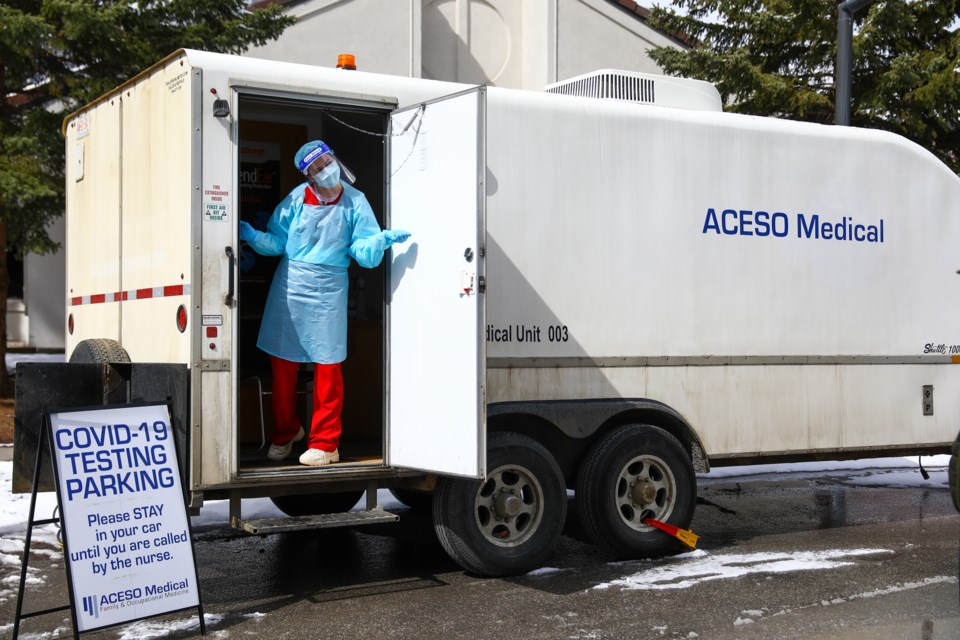BANFF – The number of active COVID-19 cases continues to quickly climb in Banff as Alberta announced plans to scrap isolation rules.
The more contagious delta variant has quickly pushed the number of active cases in Banff to 20 as of July 28 in the last two weeks. However, Stoney Health Services has reported zero since July 23.
The transmission risk for COVID-19 in Morley is now considered moderate, according to Stoney Health Services, which stressed more community members need to be vaccinated in order for the risk to be low.
In Banff, officials continue to encourage residents to be careful and get vaccinated as active cases continue rising.
"The delta variant is very aggressive and it transmits very easily," said Silvio Adamo, the Town of Banff's director of emergency management in a recent interview.
"We want to make sure that everyone stays as safe and as healthy as possible."
As of July 27, there were 1,334 active cases across Alberta. Currently, 84 people are being treated for COVID-19 in hospital, including 18 admitted to intensive care units.
According to the province, almost 75.6 per cent of Albertans over the age of 12 have now received at least one dose of COVID-19 vaccine, and 64.3 per cent are fully immunized.
“Vaccines dramatically reduce the risk of severe outcomes and the risk of infection,” said Dr. Deena Henshaw, Alberta’s top doctor of medical health, during a July 28 briefing.
Hinshaw said 95 per cent of all cases since January were unvaccinated or still developing immunity in the early days after a first dose.
She said the same goes for hospitalizations, where 92 per cent since January had no vaccine or were still within two weeks of their first dose.
“Just one patient of the 18 in the ICU right now was fully vaccinated – all the rest did not have the benefit that two doses of vaccine offer.” she said.
“Having two doses of vaccine has never been more important. The Delta variant spreads more easily and that second dose is critical for protection.”
With so many people protected by vaccines, and doses available right now for everyone aged 12 and over, Hinshaw said the threat of this still dangerous virus is shifting.
“While COVID-19 cases may rise in the coming weeks and months, a surge of hospitalizations and other severe outcomes is much less likely thanks to vaccines,” she said..
“I know that the rise in cases over the last week has created some anxiety in people. Vaccines are able to drastically reduce the risk of not only contracting the virus but, more importantly, getting severely ill.”
HInshaw said it’s time to also start preparing for other health challenges.
She said there has been an extraordinary decline in other respiratory viruses, adding there there was not a single case of seasonal influenza identified.
“With the unprecedented public health measures used over the last year no longer in place, we will likely see higher levels of other respiratory viruses like influenza starting late this summer and into the fall,” she said.
“Vaccines for some viruses, like influenza, are available. But it will mean more patients needing testing for clinical reasons and, in some cases, medical care. We need to make sure that Alberta’s health system is able to support all patients.”
This has prompted the province of Alberta to bring COVID-19 measures in line with how it handles other respiratory viruses.
Starting on Aug. 16, isolation will no longer be universally legally required for those who test positive for COVID-19, although it may be required in some high-risk settings.
“Staying home when sick will remain an important way to care for those around us by not passing on any infection, COVID or any other,” Hinshaw said.
After Aug. 31, testing for COVID-19 will be available for patients whose symptoms are severe enough to need care in hospitals or physicians’ clinics.
“It will be conducted when needed for informing treatment decisions, and as needed for outbreaks in high-risk settings,” she said.
Universal masking is no longer going to be required when schools go back in fall.
“However, we will be recommending it as a temporary outbreak intervention in response to respiratory outbreaks,” Hinshaw said.
At the same time, the province will launch a wastewater testing program to monitor the province.
Hinshaw said testing wastewater has proven to be an accurate and valuable tool in providing early warning of a possible rise in cases.
“This program will work hand in hand with individual testing results to give us a good sense of where COVID-19 is in the province,” she said.
Hinshaw stressed that COVID is not over, that it is still a very serious virus that can have life-threatening consequences.
She pleaded with all eligible Albertans to get vaccinated.
“I encourage you to take the opportunity to access this life-saving intervention and make the choice to get protected,” she said..
“Vaccine will protect you, it will protect those around you, and it will keep our entire province safer in the months ahead.”




